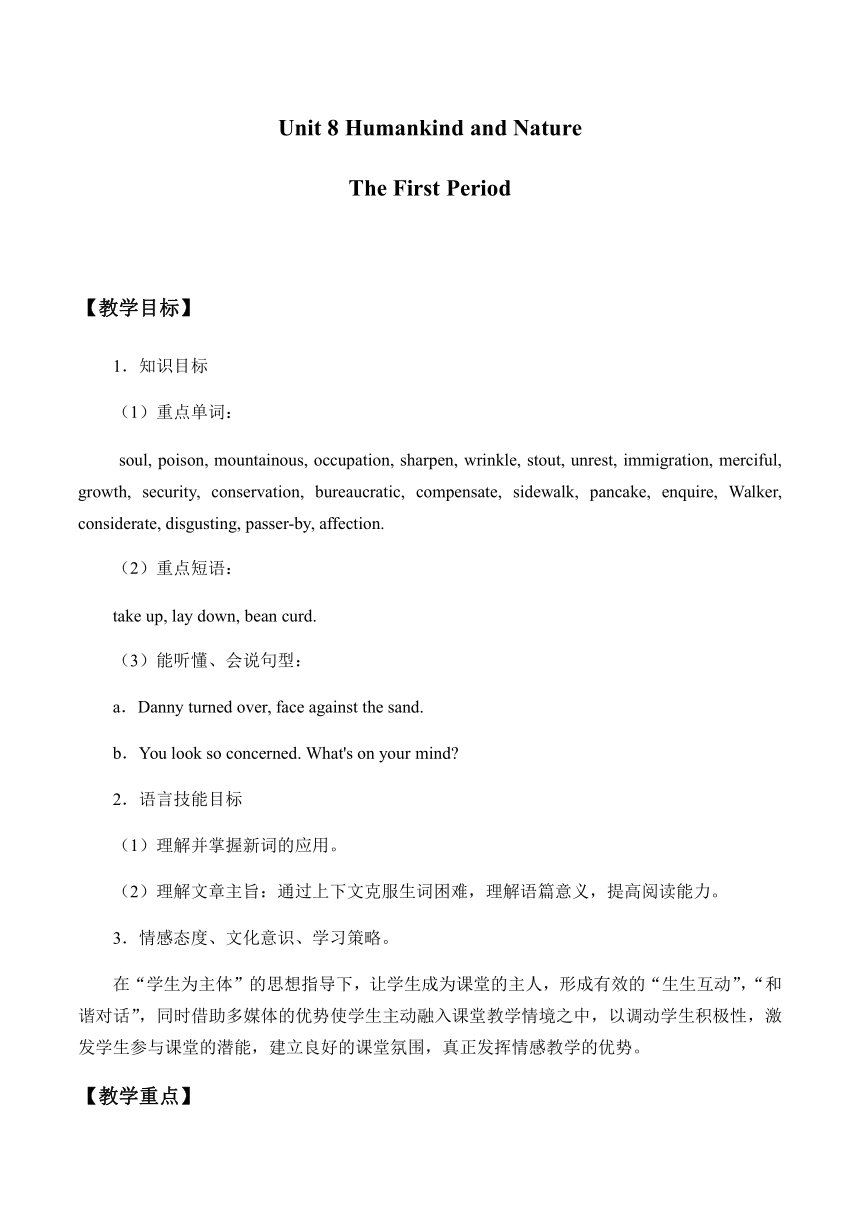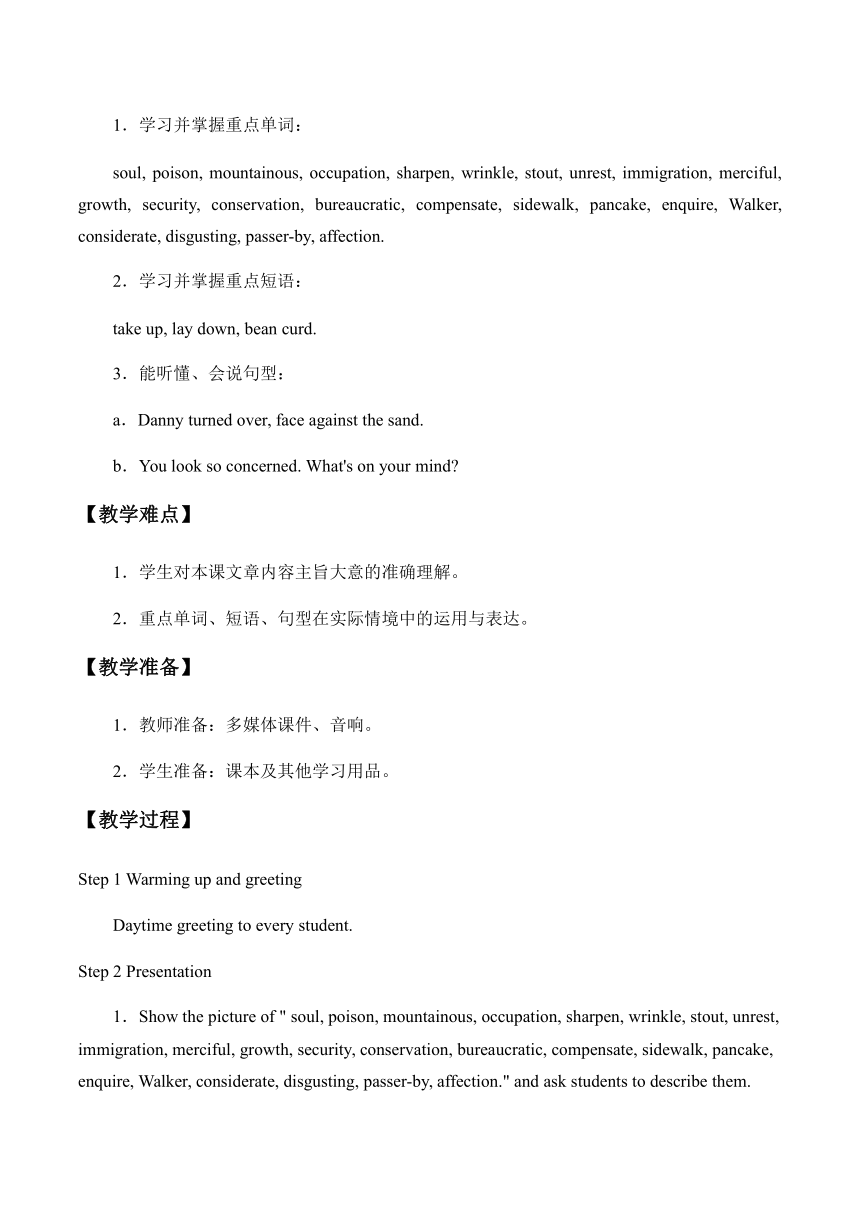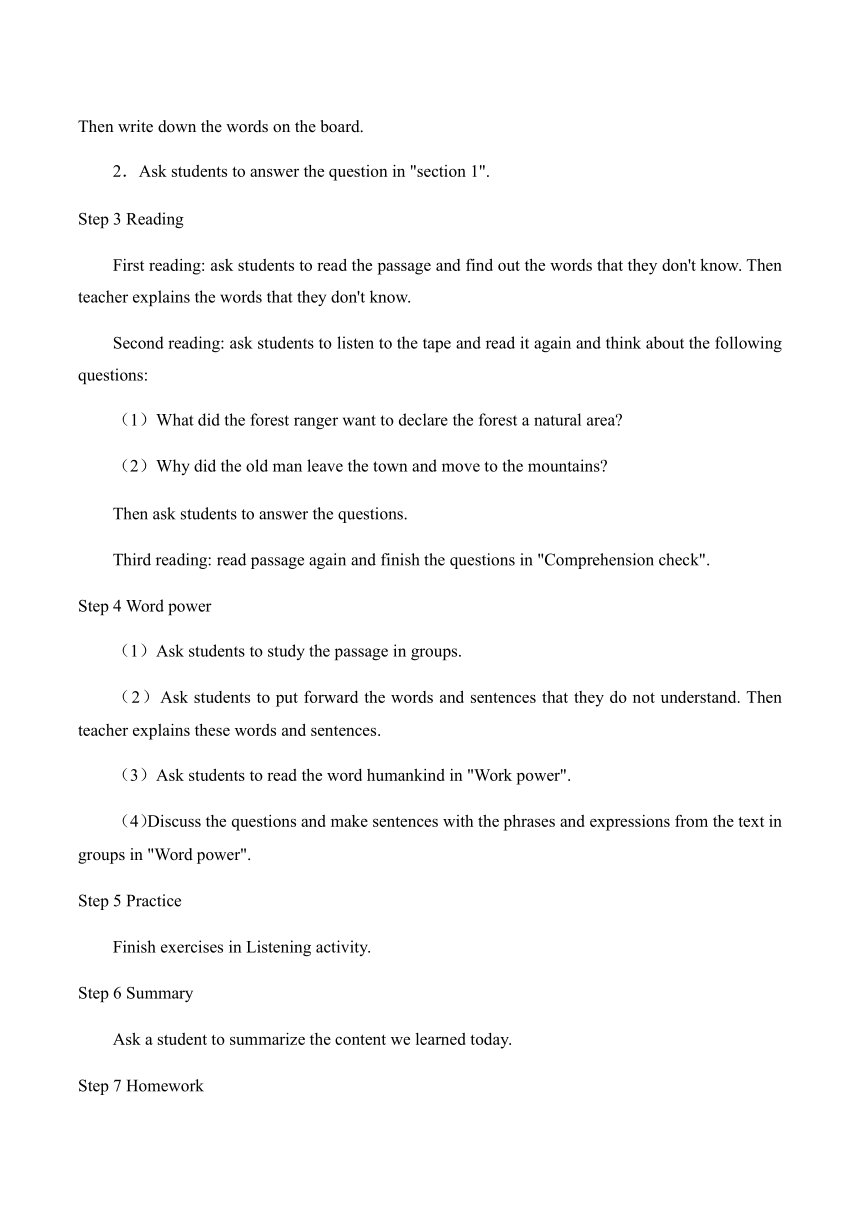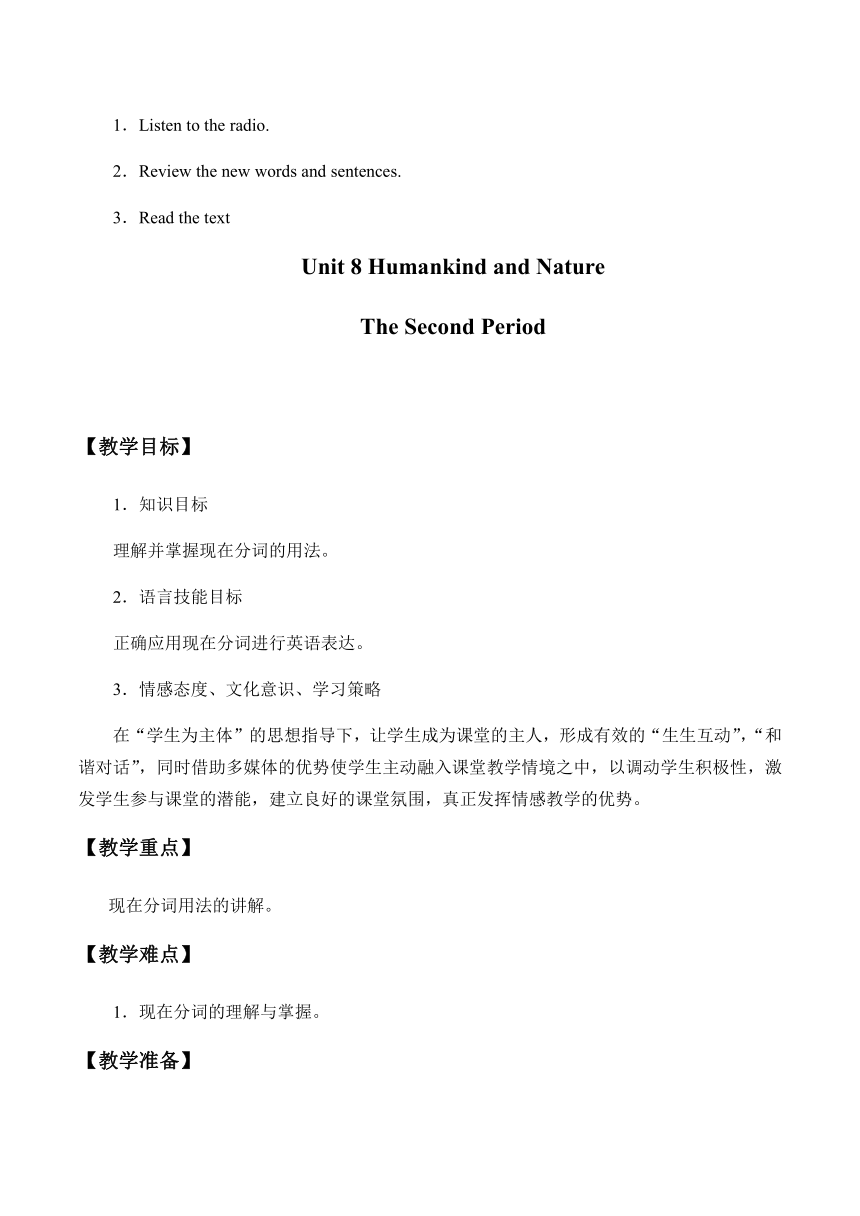冀教版选修八Unit 8 Humankind and Nature单元教案
文档属性
| 名称 | 冀教版选修八Unit 8 Humankind and Nature单元教案 |

|
|
| 格式 | zip | ||
| 文件大小 | 35.0KB | ||
| 资源类型 | 教案 | ||
| 版本资源 | 冀教版 | ||
| 科目 | 英语 | ||
| 更新时间 | 2020-02-21 00:00:00 | ||
图片预览




文档简介
Unit 8 Humankind and Nature
The First Period
【教学目标】
1.知识目标
(1)重点单词:
soul, poison, mountainous, occupation, sharpen, wrinkle, stout, unrest, immigration, merciful, growth, security, conservation, bureaucratic, compensate, sidewalk, pancake, enquire, Walker, considerate, disgusting, passer-by, affection.
(2)重点短语:
take up, lay down, bean curd.
(3)能听懂、会说句型:
a.Danny turned over, face against the sand.
b.You look so concerned. What's on your mind?
2.语言技能目标
(1)理解并掌握新词的应用。
(2)理解文章主旨:通过上下文克服生词困难,理解语篇意义,提高阅读能力。
3.情感态度、文化意识、学习策略。
在“学生为主体”的思想指导下,让学生成为课堂的主人,形成有效的“生生互动”,“和谐对话”,同时借助多媒体的优势使学生主动融入课堂教学情境之中,以调动学生积极性,激发学生参与课堂的潜能,建立良好的课堂氛围,真正发挥情感教学的优势。
【教学重点】
1.学习并掌握重点单词:
soul, poison, mountainous, occupation, sharpen, wrinkle, stout, unrest, immigration, merciful, growth, security, conservation, bureaucratic, compensate, sidewalk, pancake, enquire, Walker, considerate, disgusting, passer-by, affection.
2.学习并掌握重点短语:
take up, lay down, bean curd.
3.能听懂、会说句型:
a.Danny turned over, face against the sand.
b.You look so concerned. What's on your mind?
【教学难点】
1.学生对本课文章内容主旨大意的准确理解。
2.重点单词、短语、句型在实际情境中的运用与表达。
【教学准备】
1.教师准备:多媒体课件、音响。
2.学生准备:课本及其他学习用品。
【教学过程】
Step 1 Warming up and greeting
Daytime greeting to every student.
Step 2 Presentation
1.Show the picture of " soul, poison, mountainous, occupation, sharpen, wrinkle, stout, unrest, immigration, merciful, growth, security, conservation, bureaucratic, compensate, sidewalk, pancake, enquire, Walker, considerate, disgusting, passer-by, affection." and ask students to describe them. Then write down the words on the board.
2.Ask students to answer the question in "section 1".
Step 3 Reading
First reading: ask students to read the passage and find out the words that they don't know. Then teacher explains the words that they don't know.
Second reading: ask students to listen to the tape and read it again and think about the following questions:
(1)What did the forest ranger want to declare the forest a natural area?
(2)Why did the old man leave the town and move to the mountains?
Then ask students to answer the questions.
Third reading: read passage again and finish the questions in "Comprehension check".
Step 4 Word power
(1)Ask students to study the passage in groups.
(2)Ask students to put forward the words and sentences that they do not understand. Then teacher explains these words and sentences.
(3)Ask students to read the word humankind in "Work power".
(4)Discuss the questions and make sentences with the phrases and expressions from the text in groups in "Word power".
Step 5 Practice
Finish exercises in Listening activity.
Step 6 Summary
Ask a student to summarize the content we learned today.
Step 7 Homework
1.Listen to the radio.
2.Review the new words and sentences.
3.Read the text
Unit 8 Humankind and Nature
The Second Period
【教学目标】
1.知识目标
理解并掌握现在分词的用法。
2.语言技能目标
正确应用现在分词进行英语表达。
3.情感态度、文化意识、学习策略
在“学生为主体”的思想指导下,让学生成为课堂的主人,形成有效的“生生互动”,“和谐对话”,同时借助多媒体的优势使学生主动融入课堂教学情境之中,以调动学生积极性,激发学生参与课堂的潜能,建立良好的课堂氛围,真正发挥情感教学的优势。
【教学重点】
现在分词用法的讲解。
【教学难点】
1.现在分词的理解与掌握。
【教学准备】
1.教师准备:多媒体课件、音响。
2.学生准备:课本及其他学习用品。
【教学过程】
Step 1 Warming up and greeting
Daytime greeting to every student.
Step 2 Presentation
1.Show different sentences and words in ppt and ask students to sort them out and tell the differences between the sorts. Then write down "Verb-ing: Tenses" on the board and explain the definitions.
2.Learn " Verb-ing: Tenses ".
Ask students to look at part A and discuss in groups to discover the rules about Verb-ing: Tenses. Then ask a presentation to express their answers then teacher concludes the rules.
3.Explain More on the Passive Voice in part B and ask students to write more similar sentences.
4.Learn part C "Semicolon (;)"
Ask students to study the sentences to see how the semicolon is used in different contexts.
Step 3. Group works
Divide students into two groups, and ask each group to do one of the following two parts according to the following questions or requirements:
Part D
(1)Danny's grammar questions.
Part E
(1)Questions and answers.
(2)Can you catch the humour?
(3)Just for laughs!
After that, ask one of the students in different groups to share their results and teacher emphasizes important points.
Step 4 practice
Ask students to finish exercises in P92.
Step 5 Summary and Homework
Ask a student to summarize the grammar we learned today, and to finish other exercises this part in book.
Unit 8 Humankind and Nature
The Third Period
【教学目标】
1.知识目标
(1)重点单词:
soul, poison, mountainous, occupation, sharpen, wrinkle, stout, unrest, immigration, merciful, growth, security, conservation, bureaucratic, compensate, sidewalk, pancake, enquire, Walker, considerate, disgusting, passer-by, affection.
(2)重点短语:
take up, lay down, bean curd.
(3)能听懂、会说句型:
a.Danny turned over, face against the sand.
b.You look so concerned. What's on your mind?
2.语言技能目标
(1)理解并掌握新词的应用。
(2)理解文章主旨:通过上下文克服生词困难,理解语篇意义,提高阅读能力。
3.情感态度、文化意识、学习策略。
在“学生为主体”的思想指导下,让学生成为课堂的主人,形成有效的“生生互动”,“和谐对话”,同时借助多媒体的优势使学生主动融入课堂教学情境之中,以调动学生积极性,激发学生参与课堂的潜能,建立良好的课堂氛围,真正发挥情感教学的优势。
【教学重点】
1.学习并掌握重点单词:
soul, poison, mountainous, occupation, sharpen, wrinkle, stout, unrest, immigration, merciful, growth, security, conservation, bureaucratic, compensate, sidewalk, pancake, enquire, Walker, considerate, disgusting, passer-by, affection.
2.学习并掌握重点短语:
take up, lay down, bean curd.
3.能听懂、会说句型:
a.Danny turned over, face against the sand.
b.You look so concerned. What's on your mind?
【教学难点】
1.学生对本课文章内容主旨大意的准确理解。
2.重点单词、短语、句型在实际情境中的运用与表达。
【教学准备】
1.教师准备:多媒体课件、音响。
2.学生准备:课本及其他学习用品。
【教学过程】
Step 1 Warming up and greeting
Daytime greeting to every student.
Step 2 Presentation
1.Show the picture of " soul, poison, mountainous, occupation, sharpen, wrinkle, stout, unrest, immigration, merciful, growth, security, conservation, bureaucratic, compensate, sidewalk, pancake, enquire, Walker, considerate, disgusting, passer-by, affection." and ask students to describe them. Then write down the words on the board.
2.Ask students to answer the question in "section 1".
Step 3 Reading
First reading: ask students to read the passage of "What should we do?" and find out the words that they don't know. Then teacher explains the words that they don't know.
Second reading: ask students to listen to the tape and read it again and think about the following questions:
(1)Why did the forest ranger want to declare the forest a natural area?
(2)Why did the old man leave the town and move to the mountains?
Then ask students to answer the questions.
Third reading: read the passage of "What should we do?" and answer the questions.
Step 4 Passage learning—"After you read"
(1)Ask students to study the passage in groups.
(2)Ask students to put forward the words and sentences that they do not understand. Then teacher explains these words and sentences.
(3)Ask students to finish questions in "After you read", then check the answer.
(4)Discuss the questions of "What message does the story told by Allan's mother carry to you?" in groups.
Step 5 Practice
Finish exercises in Unit closing.
Step 6 Summary
Ask a student to summarize the content we learned today.
Step 7 Homework
1.Listen to the radio.
2.Review the new words and sentences.
3.Read the text
